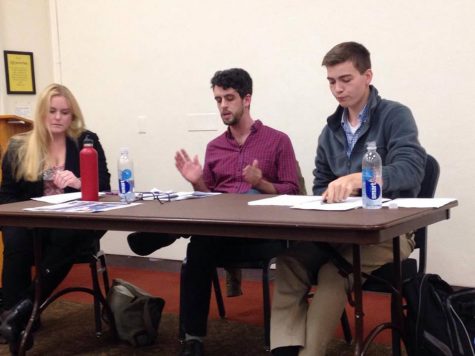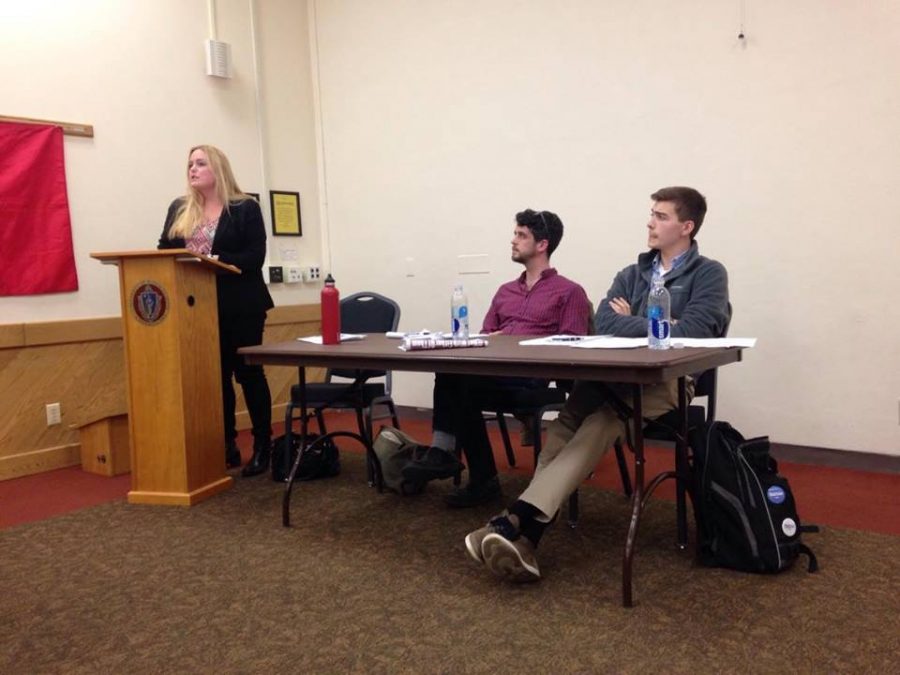Democrats and Socialists debate the future of progressivism in American politics
More stories from Carson McGrath
AMHERST — Students and community members gathered for a debate and discussion about the future of progressivism in the 2016 election and beyond Wednesday in the basement of the Campus Center at the University of Massachusetts Amherst.
The event was titled “How do we fight Trumpism and the rise of the right?”and was held by the UMass Amherst International Socialist Organization (ISO), featuring one panelist each from the Democratic and Socialist parties.
Megan Lemay, a member of the ISO and debate moderator, said the group invited Republicans on campus to join the debate but they declined.
Lemay started the event off with a gesture of support for the protesters opposing the Dakota Access Pipeline in North Dakota, passing around a jar reading “chip in for some revolutionary change.” All donations collected at the event will be sent to the protesters at Standing Rock.
The two debate panelists were Casey Pease, representing the Democrats, and Ben Taylor, representing the socialists.
Pease is a UMass political science student, former Bernie Sanders field staff organizer and a political activist.
Taylor is a UMass political science alumni, community activist and ISO member.
The first question posed to the panelists was who they planned to vote for and why, as well as what they think progressives should do in this election.
Pease said he plans on voting for Hillary Clinton in November. A former Sanders supporter, Pease said that the work from Sanders’ campaign pushed the Democratic Party to put forth the most progressive platform in history.
“I have come to the conclusion that I am voting for Hillary Clinton. My reason is because the republicans have nominated not just a right wing candidate, but they have nominated somebody who I believe to be a great danger to our democracy and our public,” he said.
Pease went on to say that Republican Nominee Donald Trump denies the existence of global warming, believes it’s a hoax created by the Chinese, is open to using more fossil fuels, plans to deport 11 million undocumented immigrants and calls for more stop and frisk procedures to be used by police.
Because of Trump’s established views on these issues, Pease believes voting for Clinton is the most important thing progressives can do to keep him out of office and from implementing policies that he believes would harm the American people.
But Pease still has reservations about Clinton, he said.
“The way we continue organize and implement a progressive vision is first, on November 8 elect Hillary Clinton and on November 9, fight like hell,” Pease said.
Taylor answered the question by drawing attention to the protesters at Standing Rock, stating each candidate’s stance on the Dakota Access Pipeline is a reflection on their character and morals.
Because of Clinton’s statement on the pipeline, he will be voting for Green-Rainbow Party candidate Jill Stein, the only presidential candidate to actually go to Standing Rock, he said.
“For me, the choice between Hillary Clinton and Jill Stein is like night and day,” Taylor said.
Taylor said he plans to vote for Stein because he believes she is a candidate who got involved in politics due of a “deep concern for the environment and public health.”
“Progressives should vote their conscious on Tuesday,” Taylor said.
The next questioned asked how progressives can defeat Trump and the “rise of the far right” he has inspired.
Taylor argued that the rise of the right is not a phenomenon unique to the United States, but can also be seen in Greece, the United Kingdom, the Philippines and Brazil.
“Whether Trump loses next Tuesday, the far right is not going anywhere,” Taylor said.

Referring to Trump as the “GOP Frankenstein,” Taylor said that unlike other Republicans, “Trump does not disguise his bigotry with dog whistle politics.”
In order to defeat the rise of the right, Pease said voting for Hillary Clinton is the first step.
He called for organizers to “piggyback” off the grassroots structure of Bernie Sanders’ primary campaign in order to elect progressive candidates. Pease also feels it is important to create more resources for voter mobilization and get more citizens in voter booths.
“That is going to take time, this is not going to be an easy thing to do, and that is why I absolutely support Bernie Sanders because and I am going to stick with him on this one,” said Pease.
During Thanksgiving break, Pease said he plans to go to Standing Rock to show his solidarity with the protesters in North Dakota. He recently signed a petition urging Clinton to take a stand on the pipeline.
The debate then moved on to foreign policy and the conflicts occurring in the Middle East.
Taylor said the Bush administration of strategy of “divide and conquer” continued under Obama’s Democratic presidency.
“When it comes to war nothing will get better under Trump or Clinton, both favor a muscular foreign policy,” said Taylor.
Pease agreed that the issue of war is not something to be taken lightly.
“We need to always have war as our last option, always our last option, and put diplomacy first,” he said.
Seeing as both Taylor and Pease plan on voting for female presidential candidates, Lemay asked how their candidates would improve the lives of women in this country and how they see their vote as being feminist.
Pease said that after speaking with his 88-year-old aunt — who never thought she would be able to vote for a female president in her lifetime, but early voted for Clinton — the impact that these two female candidates are making for women is incredibly important.
Pease said his vote will go to Clinton because of her strong history of advocating for women’s issues, citing her lifelong fight for women’s health care, where she stands with Planned Parenthood and her vow not to nominate a Supreme Court Justice who would overturn Roe v. Wade.
“If Trump gets elected, we will be going back 50 years in time and that is something to very seriously consider when deciding who to vote for November 8,” Pease said.
Taylor said Clinton’s brand of feminism is not one that he supports, referring to her feminism as “white feminism” and one that only seeks to put women in more corporate boardrooms. Instead, Taylor believes Stein’s brand of feminism is intersectional and is deeply woven with labor rights and the anti-war struggle.
The event closed audience questions and personal statements on issues discussed during the debate. Both panelists thanked the ISO for the opportunity to have a conversation about the future of progressivism in American politics.
Email Carson McGrath at cmcgrath@umass.edu or follow her on Twitter @McGrathCarson.

